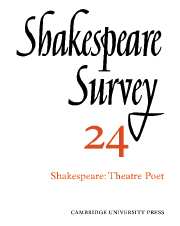Book contents
- Frontmatter
- Hearing Shakespeare: Sound and Meaning in ‘Antony and Cleopatra’
- ‘More Pregnantly Than Words’: Some Uses and Limitations of Visual Symbolism
- Shakespeare and the Limits of Language
- Revenge, Retribution, and Reconciliation
- Shakespeare the Professional
- Shakespeare’s Talking Animals
- The Morality of ‘Love’s Labour’s Lost’
- Shakespeare’s ‘Earth-treading Stars’: the Image of the Masque in ‘Romeo and Juliet’
- ‘Hamlet’ and the ‘Sparing Discoverie’
- ‘Hamlet’ in France 200 Years Ago
- The Hamlet in Henry Adams
- ‘Pericles’ and the Dream of Immortality
- A Necessary Theatre: The Royal Shakespeare Season 1970 Reviewed
- Free Shakespeare
- The Year's Contributions to Shakespearian Study 1 Critical Studies
- 2 Shakespeare’s Life, Times, and Stage
- 3 Textual Studies
- Index
- Plate section
Shakespeare and the Limits of Language
Published online by Cambridge University Press: 28 March 2007
- Frontmatter
- Hearing Shakespeare: Sound and Meaning in ‘Antony and Cleopatra’
- ‘More Pregnantly Than Words’: Some Uses and Limitations of Visual Symbolism
- Shakespeare and the Limits of Language
- Revenge, Retribution, and Reconciliation
- Shakespeare the Professional
- Shakespeare’s Talking Animals
- The Morality of ‘Love’s Labour’s Lost’
- Shakespeare’s ‘Earth-treading Stars’: the Image of the Masque in ‘Romeo and Juliet’
- ‘Hamlet’ and the ‘Sparing Discoverie’
- ‘Hamlet’ in France 200 Years Ago
- The Hamlet in Henry Adams
- ‘Pericles’ and the Dream of Immortality
- A Necessary Theatre: The Royal Shakespeare Season 1970 Reviewed
- Free Shakespeare
- The Year's Contributions to Shakespearian Study 1 Critical Studies
- 2 Shakespeare’s Life, Times, and Stage
- 3 Textual Studies
- Index
- Plate section
Summary
It's strange that words are so inadequate. And yet we go on trying to compel them to our service Though all words fail us, even falsify our meaning.
These lines, from the last scene of T. S. Eliot’s play The Elder Statesman, express an attitude towards language characteristic of our own moment of historical time. We live in a period marked by its profound mistrust of words. How this distrust has arisen, and what the role may have been of the mass media and of the revolution in philosophy instituted by Wittgenstein in producing it, is not my concern here. I would merely suggest that when Eliot, in another work, described his own craft of poetry as ‘a raid on the inarticulate, with shabby equipment, always deteriorating’, he spoke not merely for himself as an artist but for a modern society which has become obsessed with the limitations and inadequacies of speech.
Certainly the contemporary theatre reflects this obsession. For Beckett, for Pinter, for Albee and Ionesco, dialogue has become not so much a medium of understanding, the means through which human beings reveal themselves to one another, as a measure of the hopelessness of any attempt to communicate. Words measure the gap between individuals: they do not bridge it. Every man is an island in a sense slightly different from the one John Donne had in mind, but this fact is no longer a source of suspect spiritual pride. In it, we find our own particular despair.
- Type
- Chapter
- Information
- Shakespeare Survey , pp. 19 - 30Publisher: Cambridge University PressPrint publication year: 1971
- 3
- Cited by



